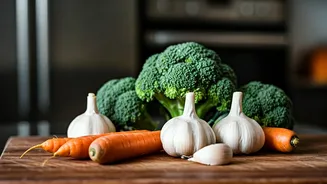The Cancer Connection
Cancer, a significant global health challenge, has spurred continuous research into effective preventative measures. Diet plays a crucial role in this,
and studies suggest that certain foods can significantly influence cancer risk. Experts emphasize that incorporating specific vegetables into one's daily diet can be a proactive step towards reducing susceptibility. This article aims to explore three vegetables, as suggested by a gastroenterologist, with well-documented health advantages. It's imperative to recognize that while these vegetables offer potential benefits, they should be part of a broader health strategy that includes regular exercise, sufficient rest, and routine medical check-ups. The goal is to provide accessible, actionable advice that supports overall wellness and potentially helps in the fight against cancer. While no single food can guarantee complete protection, the inclusion of these vegetables is a step in the right direction.
Garlic's Powerful Properties
Garlic, a culinary staple worldwide, is packed with beneficial compounds, especially allicin, which gives it its characteristic pungent smell and is known for its antioxidant and anti-inflammatory properties. Research indicates that regular consumption of garlic may reduce the risk of certain cancers, including stomach, colon, and prostate cancers. The mechanism through which garlic exerts its effects involves its ability to block the formation and spread of cancer cells, in addition to boosting the immune system's capacity to recognize and eliminate harmful cells. Including garlic in your meals is relatively easy; it can be added to various dishes, from soups and stews to stir-fries and roasted vegetables. It is best to crush or chop the garlic before cooking, as this activates the allicin. However, the exact amount of garlic needed to achieve preventative effects remains a subject of ongoing research, making it advisable to maintain a balanced diet overall.
Carrots: Beta-Carotene Benefits
Carrots are rich in beta-carotene, a precursor to Vitamin A, known for its powerful antioxidant properties. Antioxidants combat free radicals that can damage cells and contribute to cancer development. The vibrant orange hue of carrots is a testament to their beta-carotene content. Studies show that a diet rich in carrots may be associated with a reduced risk of certain cancers, including lung, breast, and colon cancers. The beta-carotene converts to vitamin A in the body, which aids in cell growth and differentiation, which is crucial in preventing cancer. Consuming carrots in various forms—raw, cooked, juiced—can help you reap their benefits. Enjoying them as a snack with hummus, adding them to salads, or using them in stews are all great ways to ensure they become a regular part of your diet. Ensure that you pair carrots with a healthy fat source, like olive oil, to help your body absorb the fat-soluble vitamins.
Broccoli: The Cruciferous Powerhouse
Broccoli, a cruciferous vegetable, contains sulforaphane, a compound that has been extensively studied for its cancer-fighting potential. Sulforaphane stimulates the body's detoxification enzymes and helps eliminate carcinogens. Research suggests that consuming broccoli and other cruciferous vegetables can help reduce the risk of several cancer types, including breast, prostate, lung, and colon cancers. Broccoli is most effective when consumed lightly steamed or raw, as overcooking can diminish its nutritional value. Its versatility makes it easy to integrate into your meals. It can be added to salads, stir-fries, or roasted alongside other vegetables. Regular consumption, coupled with a balanced diet, contributes to a robust strategy for cancer prevention. The nutrients in broccoli work synergistically to provide a potent defense against cellular damage and, therefore, may prevent cancer development.












